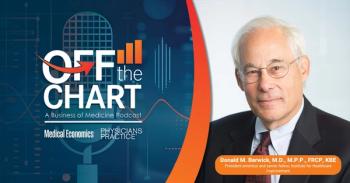
Obamacare's Victors and Victims, Including Physicians
Almost all federal legislation creates winners and losers. Under the Affordable Care Act, physicians and patients who fail to act will be the latter.
Obamacare's key goals to reduce spendingand make healthcare more affordable for the federal governmentare to pay less and charge more.This means lower fees for providers, new taxes, higher premiums, and shifting fiscal responsibility in the form of higher deductibles for patients.
The stakes escalate as House Republicans and Senate Democrats meet in the new budget conference committee established by the October temporary spending bill to avoid another budget and debt-limit showdown. They have until December 13.
Republicans are demanding cuts and changes in Medicare, Medicaid, and Social Security, while Democrats are insisting on at least some new revenue, such as ending various corporate tax breaks.
As a result, the healthcare industry finds itself facing another round of payment cuts on top of Obamacare and the sequestration cuts that were extended by the October budget deal.
The framework for all of this was there all of the time. In black and white. Ignored by proponents. Underscored by opponents. Both confounding the public.
Until now, the public conversation and legislative war has been about the politics of insurance reform, and it has been the wrong conversation, and the wrong war.
It is no longer liberal or conservative, libertarian or progressive. Reality simply doesn't care.
Sadly, the vast majority of physicians and other providers are paralyzed by indecision or are chanting the mantra of denial, all hoping the federal government will stop short and deliver a reprieve.
It won't. This is law, not policy.
If they fail to act, they, and their patients, will be the victims.
Others are taking action by finding ways to mitigate the impact on how much they will be paid by focusing on reducing spending - and keeping as much of the difference as they can.
They key is preventing, stalling, or reversing the progression of chronic disease, and keeping people out of the hospital and emergency department, which represents 80 percent of non-Medicare spending, and 96 percent of Medicare spending.
Those making minor changes under federally sponsored programs will make minor progress. The entrepreneurial transformers will make meaningful progress.
They, to the degree of innovation and transformation they adopt, and their patients, will be the victors.
It won’t be easy, and will require partners that can provide training and technology and participation in a network is a must, but, the industry taking the lead to reduce spending is the only way to survive government action to save itself.
If HHS, CMS, Congress, and the president can get beyond politics and hubris to enable change rather than regulation, we all win.
Otherwise, we will have to find success in spite of Obamacare, Congress, HHS, CMS, and the administration who only know how to regulate and mandate, not enable.
In truth, as an industry, we have brought this upon ourselves through our silence, failure to see and work to fix the crisis already upon us, and, by clinging to a failed system.
So, it was done for us with much more to come.
Now, the question we must each ask is whether we will rise to the challenge or fall into catastrophe.
Newsletter
Optimize your practice with the Physicians Practice newsletter, offering management pearls, leadership tips, and business strategies tailored for practice administrators and physicians of any specialty.








